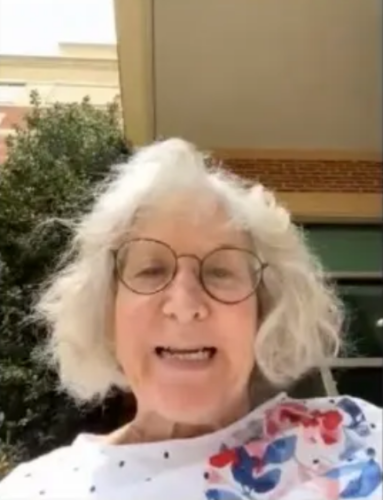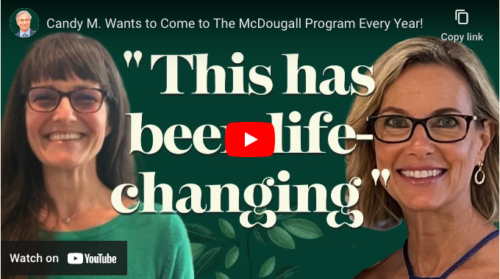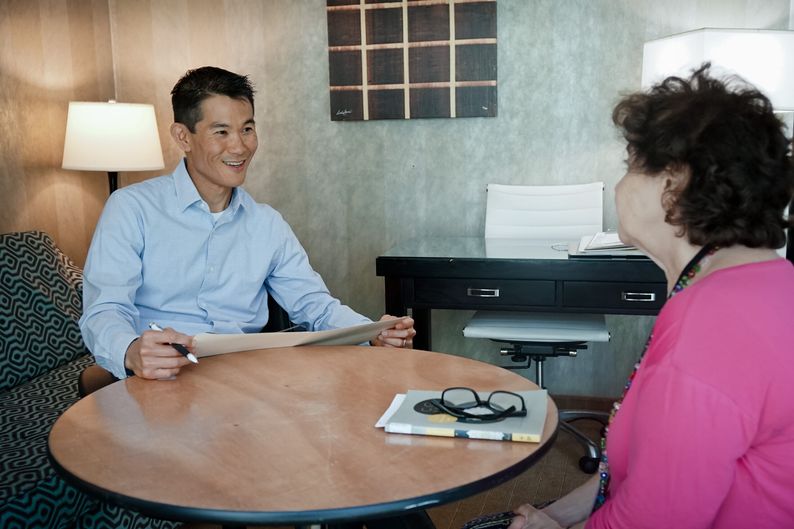Karen Barrow: Lost 100 Pounds & Kept it Off
Karen Barrow lost 100 pounds and kept it off for 3 years by eating a delicious low-fat starch-based diet.
Finally, the path to permanent weight-loss
I began struggling with weight-gain after giving birth to my two children: I was 29 years old, stood 5’4″, and weighed 165 pounds. In the early eighties I went through a divorce and other emotionally challenging periods and started eating as a way to comfort myself. In a matter of just a couple of years, I was 100 pounds overweight. I was now 37 and weighed 235 pounds.
In 1990, at age 40, I joined Weight Watchers and ended up losing all my extra weight in about 18 months. I ate the standard American diet but restricted my calorie intake by eating small portions at each meal. I ended up taking a job with Weight Watchers, and the environment of constant reinforcement enabled me to keep the weight off for five years.
However, I was often hungry because the allowed portions were so small, and this often led me to break the rules. I was seldom satisfied and often on the verge of going over my weight limit (if you go over your weight limit for a long stretch of time you can lose your job!). My view of dieting at this time was not “What is healthiest for my body?” but rather, “What can I get away with eating and not gain weight?”
When I eventually left my job at Weight Watchers, gone was the constant reinforcement to keep my weight down. My perpetual hunger led me to regain of all my lost weight. I was now back at my original high weight of 235 pounds.
Due to the extra weight, I developed asthma, pre-diabetes (my blood glucose was 103 mg/dL), and I began to feel hopeless. Gaining back the extra weight at age 50 took a much greater toll on my body than it had the first time around. I had little energy, was short of breath with minimal exertion, and my back and knees hurt. Believe it or not, my doctor at the time never even mentioned that I should lose weight. His explanation was that it was all due to my genes.
In January of 2003, I decided to try to get things under control yet again. I did not rejoin Weight Watchers, but instead created my own portion-controlled calorie-counting regimen based on what I had learned at Weight Watchers. I also joined a Jazzercise class, the first form of exercise I had ever enjoyed during my previous weight loss. However, the weight came off much more slowly since I was now older.
During the first year I lost 45 pounds, the next year I lost 30, and then my progress came to a halt. At this point I weighed 160 pounds, which was still 25 pounds from my target weight. Worse yet, despite having lost a total of 75 pounds, my cholesterol was 281 mg/dL (far more than the 200 mg/dL many doctors say is desirable) and on a good day my blood pressure was 145/90 mmHg. My doctor suggested I begin taking blood pressure medication.
Clearly, my calorie-controlled standard American diet was not having the positive effect I had hoped for. Not wanting to be tied to medication for the rest of my life, I decided to decline my doctor’s recommendation for pills and instead began reading about how I could reduce my blood pressure naturally.
Discovering the path to permanent weight-loss
My research led me to seriously cut back on my salt intake, which eventually led me to the work of Dr. McDougall. I remembered reading some of his books in the eighties, but rejected his recommendations of a low-fat, plant-based diet as being “too extreme.” But now in 2005, while facing a future of declining health, they no longer seemed so extreme.
I didn’t really care for meat, but my dairy and cheese consumption was driving my cholesterol through the roof. I began to wonder, “What’s so extreme about oatmeal and bananas for breakfast, boiled potatoes and green salads for lunch, and baked sweet potatoes and broccoli for supper?” So I began, and soon discovered the McDougall plan was quite simple, the foods were delicious and, most importantly, the meals were filling!
I no longer had to count calories and control my portions. I went on to discover hundreds of recipes in the McDougall books, newsletters, and on the website. I have since lost my last 25 pounds, and have reached my target weight of 135 pounds. My most recent cholesterol reading was 142 mg/dL, my blood glucose was 78 mg/dL, and my blood pressure on a typical day is 115/75 mmHg.
My husband, Tom, also decided to adopt the McDougall lifestyle along with me in 2005. He has since lost 80 pounds and is a Star McDougaller in his own right. My oldest son and daughter-in-law have adopted the McDougall diet and have had excellent results. My youngest son, who is a sous-chef in an upscale restaurant, does not follow the same eating style as we do but is supportive. (I’m trying to persuade him to add some McDougall-friendly items to the menu, or at least when Mom comes to visit.)
Today, at age 56, I exercise daily, doing Jazzercise five days a week, as well as occasional walking, running, and biking. My friends at Jazzercise have witnessed my entire weight-loss process, and they applaud me. When newcomers hear about my history, they will often ask how I achieved such success, and I am always happy to share my story with them.
I have also stopped drinking alcohol, coffee, and caffeinated beverages. Now when I get out of bed I feel very awake and my energy stays level throughout the day. I love the way I look, but even more I love the way I feel: light, energetic, strong, and confident that I can do this for the rest of my life and never have to worry about portion control and weight gain again.
I look forward to a long and healthy life while continuing to follow the McDougall diet. I am not an overnight sensation. It has taken persistent effort to get where I am today. But as the old fable says: Slow and steady wins the race.
Karen Barron
Oak Ridge, Tennessee
February 2008
Dr. McDougall’s Comments
On the first day of each 10-day live-in McDougall Program in Santa Rosa, California, I begin my first lecture by telling participants that those people who have “failed” repeatedly at dieting in the past are the ones who are almost certain to succeed this time, because they have, over the years, put the work in required to finally make changes permanent. Now the staff members of The McDougall Program are going to add the finishing touches. Karen’s learning experiences from Weight Watchers were essential for her success with us. Without these “failures” The McDougall Program would have amounted to no more than one of the beginning steps in her journey for better health.
Many people also come to our program with stories of having “failed” with the Pritikin or Ornish Programs, and I try to explain to them that these educational experiences were necessary steps and I remind them that when they look back they must give deserved credit to these excellent programs.
More than half of the people who attend our live-in program have previously tried to follow our recommendations from the McDougall books and DVDs. Fortunately, most of them had experienced sufficient benefits to understand the value of our low-fat, starch-based diet and exercise. But, because permanent changes require time and effort they “fell off the wagon,” as the saying goes. Many experimented, before and after their McDougall experiences, with completely opposite, low-carbohydrate, high-protein diets (Atkins, Zone, etc.). They received painful lessons from these diets. Finally through persistence they decided, as Karen did, to commit to the McDougall Program—and that commitment was the turning point. (She recently dedicated 10 days to focusing on her health at our center.)
One comment I enjoy making to people is, “Those of you who have known me for many years will notice that I (Dr. John McDougall) am looking trimer, stronger, and handsomer than the last time you saw me. And the reason is that I take better care of myself now than I did in the past—and it shows.” Few people follow a perfect diet, exercise ideally, and have pristine habits. But, as we get older we take better care of ourselves. My sincere hope is that our rate of learning stays ahead of our development of serious disease and disability. We also want to live life looking, feeling, and functioning at our best. Perfection is not required—just steady progress.
So if you feel like an “incurable failure,” think again. A worthwhile education is an ongoing, difficult, and sometimes painful process. There is no reason to give up and every reason—since life is good—to seek experiences that will make us better persons, capable of getting more of what we deserve—health, prosperity, and happiness.
Recommended Articles

Juliea Baker: Juvenile Rheumatoid Arthritis

Peggy Got Off Five Medications







